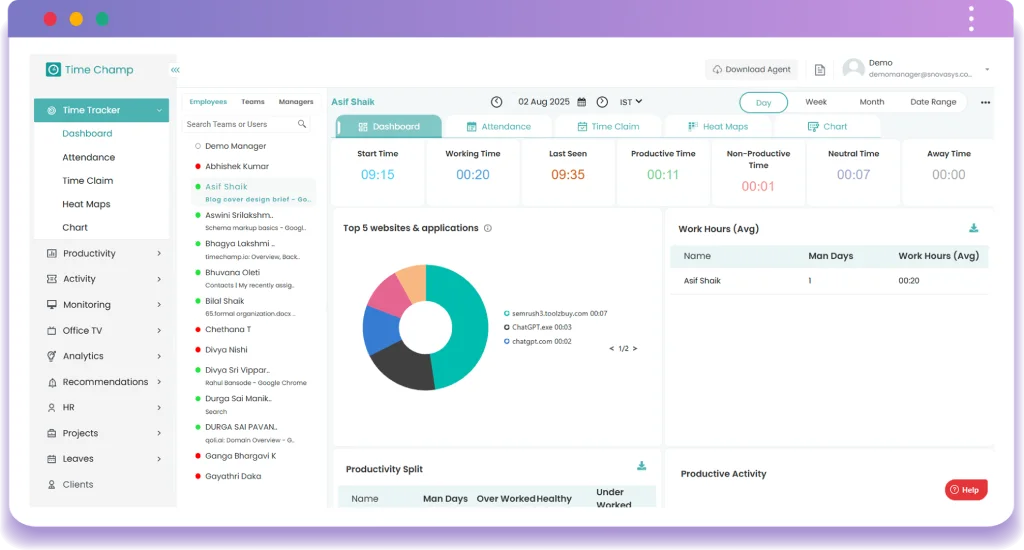Task Allocation: Meaning, Importance, Benefits & How to Assign Tasks
Task allocation is the process of placing individuals or groups onto tasks, according to skillset, role, and availability, to get work done. The practice of task allocation increases team productivity, further enhances accountability, and ensures work gets done effectively. In addition to division of labour, task allocation minimizes confusion, reduces the number and weight of workload distribution, and works towards on-time performance in a way that is more coordinated across the team.
Recognizing the importance of allocating work rightly and accurately propels workflows, promotes employee engagement, and results increase in quality. When the work is divided up properly, the members of the team can devote themselves to performing tasks they are familiar with doing, which raises morale and output. Task management allows for real-time tracking of work, performance data, and scope for agility if a project changes direction. Whether your work is in small teams or a larger level of project or work, task allocation is a contributory factor to maximise efficiency and get good results, you are missing out if you haven’t considered it as part of a strategy for all businesses today!
What is Task Allocation?
Task allocation is delegating. Team members will receive different tasks depending on their skills, availability, and workload. Task allocation allows the project manager to delegate project tasks so that team members feel that their responsibilities are fair, and they can avoid burnout. Task allocation, when used collaboratively, can encourage team member motivation by delegating tasks based on members' skill sets, so the likelihood of successful outcomes is increased. Teams working individually and trying to deliver projects are less likely to be engaged and productive.
Task allocation forms a large part of a project manager's organisation for projects. The aim of allocating tasks within the project is to ensure the right person is handling the right tasks, at the right time, and is prepared to meet deadlines. Agile-type project management and task allocation are more flexible, as tasks can be shifted between different team members if priorities shift.
Task allocation can be managed using great modern task management technology, which can use visualisation with a team to agree on task allocation, track progress and dates, and improve collaboration. Once the task allocation is agreed, project commitments can use collaboration tools to empower team members' decision-making by using or changing how team members are allocated, therefore ensuring that tasks are completed on time.
Why is Task Allocation Important?
Task allocation is an important part of improving efficiency, providing clarity for workflows, and meeting project deadlines. Because task allocation requires defining the tasks and matching the right people to those tasks based on their skills, availability, aptitude, and interest, it reduces confusion, eliminates duplication, and removes the stress of ambiguous or mismatched roles and responsibilities.
Effective task allocation not only benefits the employee’s ability to manage their time and workload but can also positively affect their well-being, happiness, and motivation, as it mitigates the potential for employees to experience burnout and workplace frustration. It allows employees to concentrate on things they do best, increases performance, and ultimately leads to better outcomes.
For managers, task allocation can help you gain insight into your team’s overall performance. It shines a light on skill gaps, aids in resource planning, and provides opportunities for targeted upskilling. The use of digital task management tools makes it easier to see the progression of the teams’ tasks and workloads and allows managers to reassign tasks in real-time. Overall, effective task allocation enhances individual performance and organizational success.
How to Allocate Tasks Effectively?
1. Understand Team Skills and Roles: Before assigning any task, evaluate the strengths, roles, and experience of each team member. This assists in ensuring that the right person carries out the right job, particularly in situations involving specialized field operations.
2. Set Clear Objectives: Define what needs to be done, the expected outcome, and the deadline. When goals are clear, field teams can work more independently and make decisions confidently on the go.
3. Prioritize Tasks Based on Urgency: Sort tasks by urgency and importance. This helps your team focus on what matters most, especially in dynamic field environments where time and resources may be limited.
4. Use Task Management Tools: Digital tools simplify task assignment, allow real-time updates, and improve communication. They’re especially useful for field teams, enabling live tracking and instant reassignment if needed.
5. Ensure Proper Communication: Always communicate the task details, expected results, and any required follow-up. For field teams, this means using clear, concise instructions that reduce back-and-forth and delays.
6. Monitor Progress and Provide Support: Track task progress without micromanaging. Utilize dashboards or check-ins to keep pace and provide support wherever necessary to make sure that the tasks are accomplished both on schedule and at the required level.
How to Overcome Challenges in Task Allocation?
1. Ineffective Communication: Miscommunication can lead to task misallocation. Use regular team meetings and approvals to articulate current team priorities and clarify your expectations.
2. Resistance to Change: Involving employees directly in the decision-making process and providing training can help ease employees through transitions.
3. Outdated Policies: Policies for task allocation should be updated regularly to stay in contact with current workflows and organizational regulatory requirements.
4. No Monitoring: Without regular review, mistakes often go unnoticed. You should monitor work progress and re-evaluate tasks if need be.
5. Limited Availability of Resources: Resources are often limited in availability; considering this, you should cross-train team members and plan effectively for resources.
What are the Examples of Task Allocation?
Task distribution happens across industries and teams. For example:
1. Marketing Team: They use writers to handle content and designers to do visuals and social media creatives.
2. Software: Developers write code, engineers do tests, and project managers manage timelines.
3. Field Service: Technicians are assigned tasks based on location, availability, and technical competence.
4. Customer Support: Tickets are assigned based on issue, urgency, and agent specialization.
5. Event Management: One member of the team is responsible for logistics, another for vendors, and a third for promotions.
How does Time Champ improve task allocation and team productivity?

Time Champ is the perfect solution. It allows organizations to allocate work to the right persons or teams based on their availability and skill sets, so you can manage workloads efficiently and improve overall productivity. The real-time live task monitoring, automatic performance report, and reminders about deadlines ensure everyone is on the same page and accountable for their work.
Time Champ will eliminate wasted time, duplicated tasks, and poor decision-making. It allows for flexibility and works in remote and hybrid work environments. In summary, Time Champ allows you to allocate work smarter, faster, and more efficiently to empower your team to perform at their best.

